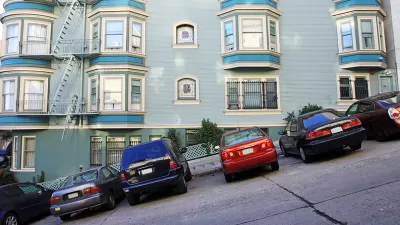The search for an available parking space in most busy downtowns can be frustrating, especially when the motorist insists on parking for free. For those cities that do charge for parking, can a variable price free-up spaces? SF hopes to prove so.
Two NYT reporters, Michael Cooper and Jo Craven McGinty provide a timely update on SF Park - a federally subsidized program that utilizes embedded sensors in on-street parking spaces to detect when a vacancy occurs and varies meter prices based on time of day and location. One main objective of the plan is to utilize pricing (often referred to as dynamic or performance pricing) and technology to reduce traffic congestion caused by motorists searching for available on-street parking.
"The program here is being closely watched by cities around the country. With the help of a federal grant, San Francisco installed parking sensors and new meters at roughly a quarter of its 26,800 metered spots to track when and where cars are parked. It is too early to tell whether the program is working over all, but an analysis of city parking data by The New York Times found signs that the new rates are having the desired effect in some areas."
However, the reporters also found that "about a fifth of the time" parking availability did not always correspond with prices, i.e. sometimes parking availability would increase with decreased prices and would decrease when prices were lowered.
"The program is the biggest test yet of the theories of Donald Shoup, a professor of urban planning at the University of California, Los Angeles. "I think the basic idea is that we will see a lot of benefits if we get the price of curbside parking right, which is the lowest price a city can charge and still have one or two vacant spaces available on every block," he said.
Thanks to Mayer Horn
FULL STORY: A Meter So Expensive, It Creates Parking Spots

Maui's Vacation Rental Debate Turns Ugly
Verbal attacks, misinformation campaigns and fistfights plague a high-stakes debate to convert thousands of vacation rentals into long-term housing.

Planetizen Federal Action Tracker
A weekly monitor of how Trump’s orders and actions are impacting planners and planning in America.

Chicago’s Ghost Rails
Just beneath the surface of the modern city lie the remnants of its expansive early 20th-century streetcar system.

Bend, Oregon Zoning Reforms Prioritize Small-Scale Housing
The city altered its zoning code to allow multi-family housing and eliminated parking mandates citywide.

Amtrak Cutting Jobs, Funding to High-Speed Rail
The agency plans to cut 10 percent of its workforce and has confirmed it will not fund new high-speed rail projects.

LA Denies Basic Services to Unhoused Residents
The city has repeatedly failed to respond to requests for trash pickup at encampment sites, and eliminated a program that provided mobile showers and toilets.
Urban Design for Planners 1: Software Tools
This six-course series explores essential urban design concepts using open source software and equips planners with the tools they need to participate fully in the urban design process.
Planning for Universal Design
Learn the tools for implementing Universal Design in planning regulations.
planning NEXT
Appalachian Highlands Housing Partners
Mpact (founded as Rail~Volution)
City of Camden Redevelopment Agency
City of Astoria
City of Portland
City of Laramie



























